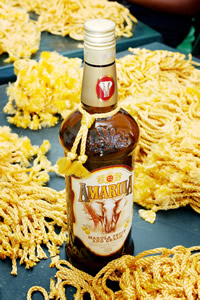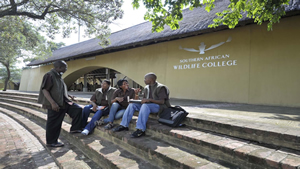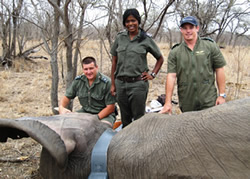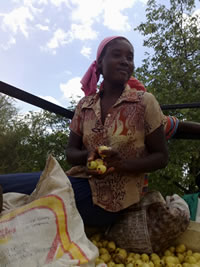“The world is full of strange behaviour
Every man has to be his own saviour
I know I can make it on my own if I try
But I’m searching for a great heart to stand me by
Underneath the African sky
A great heart to stand me by”
– Johnny Clegg
This song, written by Johnny Clegg back in 1987, can just as well be the theme song of Amarula Cream. This popular African liquor might be known for it’s captivating and exotic flavours, but there’s more to this proudly South Africa n product that meets the eye.
n product that meets the eye.
The Amarula Trust lives up to their slogan “Sustaining communities and conscious conservation”. The producers of Amarula established the trust in order to manage all the Amarula corporate social investments under one umbrella. Today, the trust supports over 60 000 rural people in the Phalaborwa region and a whole bunch of other initiatives. The main aim of the trust is to empower and educate community groups while promoting sustainable development.
Caring for the majestic giants of the bush
 One of the initiatives of the Trust is the Amarula Elephant Research Project, which focus on tracking elephant movements and ranging behaviours. The African elephant has always been an important icon of the Amarula brand and therefore they decided to established the initiative in 2002, under the direction of Professor Rob Slotow of the Kwa-Zulu-Natal University. To date Amarula has contributed over R3 million to this project and an additional R250 000 was recently donated, to ensure that the collars of the elephants can be replaced and that the programme continues to provide long term data.
One of the initiatives of the Trust is the Amarula Elephant Research Project, which focus on tracking elephant movements and ranging behaviours. The African elephant has always been an important icon of the Amarula brand and therefore they decided to established the initiative in 2002, under the direction of Professor Rob Slotow of the Kwa-Zulu-Natal University. To date Amarula has contributed over R3 million to this project and an additional R250 000 was recently donated, to ensure that the collars of the elephants can be replaced and that the programme continues to provide long term data.
Collaring an elephant is not an easy task. The big giant has to be darted, normally from the air, by a qualified veterinarian and then the rangers have to track the elephant on foot. It’s important to dart a female, as elephants are matriarchal and therefore collars are mainly attached to females. Once the collar has been attached, the GPRS signal is activated and the elephant will then resume its position in the herd and head off into the bush. The emitting signal is tracked via a comprehensive website which constantly feeds tracking behaviour, patterns and distances back to the researchers.
Some of the information gathered from this method has surprised even the researchers and thanks to the financial support of Amarula a large number of students have benefit greatly from the research programme.
The livelihood of the local residents of Phalaborwa is closely tied to the Marula tree. The fruit of the tree is used to make Amarula Cream and by late January the rural people (mainly women) will pick the fully ripened fruit from the ground and sell it to the Amarula factory. The harvest occupies only two months of the year and the producers of Amarula have established a non-profit trust to ensure that the locals have alternative income for the remainder of the year. After consulting with the tribal indunas (chiefs), who represent the local communities, a series of skills transfer projects were established. One of these projects is the secondary processing of the oil-rich marula nut, used in a range of health and beauty products.
 In the process, a crèche, clinic and recreational facilities have been created for people in the villages close to Phalaborwa, enhancing the local quality of life for residents. In Kavi a day care has been built, while a community hall, also used as a day care centre, has been constructed in Kashani.
In the process, a crèche, clinic and recreational facilities have been created for people in the villages close to Phalaborwa, enhancing the local quality of life for residents. In Kavi a day care has been built, while a community hall, also used as a day care centre, has been constructed in Kashani.
Spreading the love from Kenya to Cape
In 2006 Amarula partnered with the Kenyan Wildlife Service (KWS) that serve as a gateway to Nairobi National Park, one of Kenya’s biggest game reserves and the only park in the world located within a capital city. Street lights were erected outside the KWS’s headquarters and along the Langata Road in order to beef up security in the area and bus shelter were built outside the headquarters for the local community. This initiative made a big impact on the lives of the  Langata community. Amarula also donates 20 Kenyan shillings for every Amarula bottle purchased and the funds are utilized to support wildlife rehabilitation, improvement and maintenance of the park.
Langata community. Amarula also donates 20 Kenyan shillings for every Amarula bottle purchased and the funds are utilized to support wildlife rehabilitation, improvement and maintenance of the park.
Back in the Cape, the “Golden Thread of Hope” project has created jobs for about 85 women who stays in the Sir Lowry’s Pass village, near Grabouw. The initiative, in which women thread, knot and brush out the golden braided tassles was started in a garage in 2003 and today these tassles can be found around the neck of every Amarula bottle. These formerly unemployed women can now pay their children’s school fees, provide their families with more nutritious food, buy furniture as well as other household equipment.
And that’s not all…
 Other initiatives that fall under the Amarula Trust Fund Umbrella includes the Amarula Scholarship programme, in which they sponsor individuals from the Hoedspruit, Phalaborwa as well as Botswana, to study a Field Guide Scholarship Programme at the South African Wildlife College in Hoedspruit. Amarula also offer a wildlife bursary at the same collage and sponsor the yearly prizes for the top students.
Other initiatives that fall under the Amarula Trust Fund Umbrella includes the Amarula Scholarship programme, in which they sponsor individuals from the Hoedspruit, Phalaborwa as well as Botswana, to study a Field Guide Scholarship Programme at the South African Wildlife College in Hoedspruit. Amarula also offer a wildlife bursary at the same collage and sponsor the yearly prizes for the top students.
The Amarula Trust has recently expand its involvement in elephant conservation with a grant to the Centre for African Conservation Ecology at the Nelson Mandela Metropolitan University in Port Elizabeth. A donation of R55 000 was made to fund a research and training programme on elephant ecology and biology.
A great heart that stands you by
Johnny Clegg might have written that “every man is his own saviour” but, thanks to Amarula Cream, some individuals get a second chance in life. This alone proves that the “Spirit of Africa” has one great big heart!






